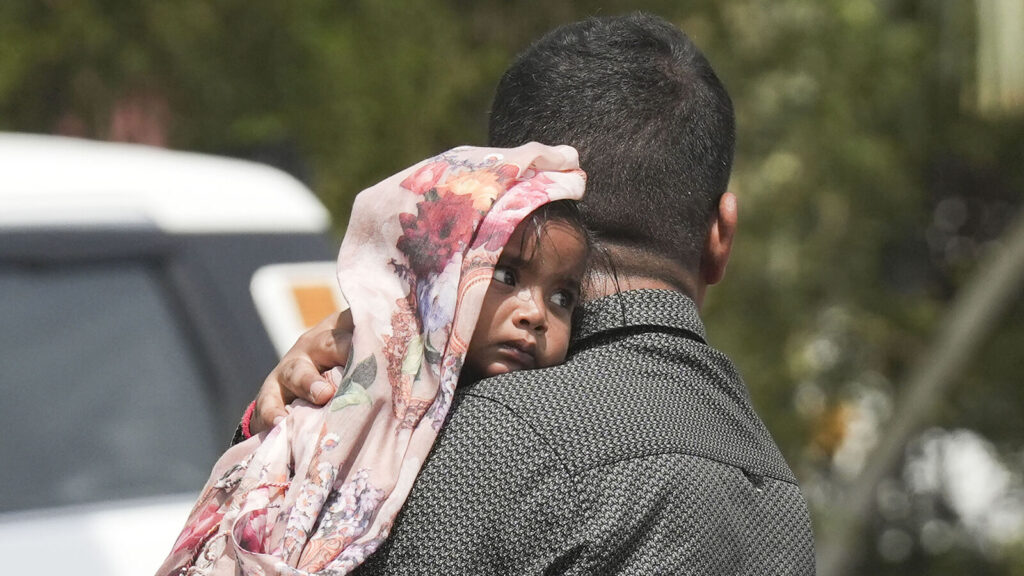Extreme heat has been hitting much of the Northern Hemisphere this week, with authorities and public health experts issuing heat warnings to keep people safe.
Parts of China, India, the Middle East, southern Europe and the United States are bracing for possible new record highs.
What are the health risks?
Heat affects your health in many ways.
Anyone can get heat stroke, with symptoms including dizziness, headache, shivering and dry throat, but it's usually not serious if the body temperature cools down within 30 minutes.
More serious, heat stroke, occurs when the core body temperature exceeds 40.6 degrees Celsius (105 degrees Fahrenheit). It is a medical emergency that can lead to long-term organ damage and death. Symptoms include rapid breathing, confusion or seizures, and nausea.
As temperatures continue to rise over the next few years due to climate change, the dangers of humidity are expected to increase as well. Warmer air can hold more moisture, and more moisture in the air makes it harder to cool yourself down by sweating.
Who is at risk?
Some people are more vulnerable, including young children, the elderly, and people who must remain active, such as the homeless, or who are at higher risk of infection.
Existing conditions such as respiratory disease, cardiovascular disease and diabetes can also increase risk, and heat can make symptoms worse.
In many countries, heat is not recorded as a specific cause of death, meaning there are no statistics measuring this risk in communities.
But a 2021 study published in The Lancet estimated that just under 500,000 people die from heatwaves each year, a conservative figure that lacks data from many low-income countries.
Many in Europe fear a repeat of the summer of 2022, when a heatwave killed an estimated 61,000 people, scientists said.
The risks will continue to grow as climate change causes global temperatures to rise further over the coming decades.
Less obvious risks
Aside from testing your internal thermostat, extreme heat can pose a variety of secondary risks.
Rising temperatures encourage the growth of bacteria and algae, so heatwaves could increase the risk of water becoming contaminated with diseases like cholera, or water bodies becoming clogged with toxic algae.
The heat could also damage crops, raising concerns about food security.
According to the World Health Organization (WHO), experts predict that from 2030 onwards, four climate-related health risks could result in an additional 250,000 deaths per year globally – heatstroke, malnutrition due to food insecurity, malaria and diarrhoea.
Wildfires caused by dry trees and shrubs can create dangerous levels of air pollution, which can cause lung inflammation and tissue damage.
Research also suggests that exposure to extreme heat and wildfire smoke may also be linked to low birth weight and premature birth.
Heat stress can also lead to poor mental health: rising night-time temperatures can disrupt people's sleep patterns and worsen their mental health.
Timing is key
Experts say many of the fatalities occur at the beginning of summer, when people's bodies are not yet accustomed to the season.
Location also matters, and in places where people are not used to such heat, including parts of Europe, they are at higher risk.
Higher temperatures make working outdoors dangerous, leading some countries and regions to close schools and force companies to reduce working hours during the day.
What you can do
Public health officials from India to the United States have issued advice on staying cool, including avoiding exercise where possible and staying hydrated.
Authorities often try to help by setting up cooling centers, distributing extra water and offering free use of air-conditioned public transport.
Scientists say workers should also consider taking more breaks and changing their clothing.
They said it was important to check on vulnerable people, including the elderly and those in isolation.
Heat stroke is a medical emergency and requires immediate professional attention.
36 million Indians visited our site in a single day and it has become the undisputed choice platform for Indian General Election Results. Check here for the latest updates.
This article has been published from a news agency feed without any modifications to the text. Only the headline has been changed.



